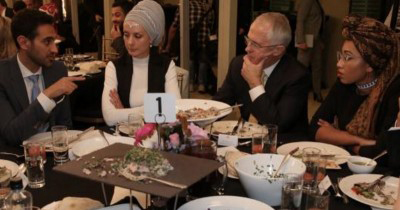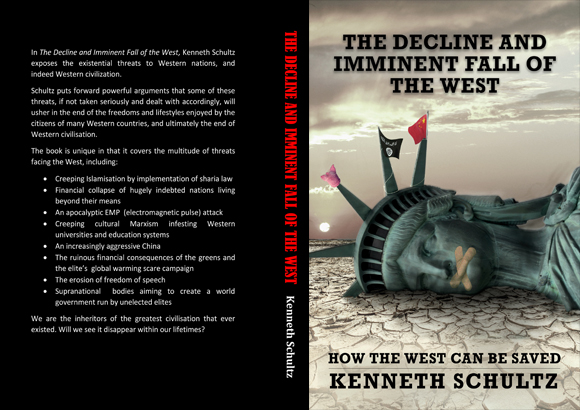 Muslim activist, Yassmin Abdiel-Magied, was at her belligerent best on Australian ABC’s Q&A program on Monday 13 February 2017 when she shouted down Senator Jacqui Lambi who dared to suggest sharia law has no place in Australia.
Muslim activist, Yassmin Abdiel-Magied, was at her belligerent best on Australian ABC’s Q&A program on Monday 13 February 2017 when she shouted down Senator Jacqui Lambi who dared to suggest sharia law has no place in Australia.
“You don’t understand sharia”, she screeched, and went on to utter one of the most inane statements ever by a Muslim apologist, “Islam is the most feminist religion of all religions”.
This embarrassingly clueless observation about women under Islam came after a $11,485 taxpayer-funded tour by Abdiel-Magieb, of Middle East countries including Saudi Arabia, Kuwait, Egypt and Sudan in November 2016 ( gifted to her by a Department of Foreign Affairs and Trade obviously contemptuous of taxpayers).
And as Somali-born author Ayaan Hirsi Ali, who is calling for a reform of Islam, points out: “As a moral and legal code, sharia law is among the most dehumanising, demeaning and degrading for women ever devised by man.”
 Ms Abdel-Magied, sitting next to Prime Minister Malcolm Turnbull at the Iftar dinner for Muslim leaders held at Kirribilli House last year to celebrate the end of Ramadan 2016.
Ms Abdel-Magied, sitting next to Prime Minister Malcolm Turnbull at the Iftar dinner for Muslim leaders held at Kirribilli House last year to celebrate the end of Ramadan 2016.
Halal caterers brought in crockery so that guests did not have to eat from plates used by non-Muslims.
Also present at the dinner was anti-gay preacher Sheik Shady Al-Suleiman who says gays should be punished by Allah with AIDS.
Under sharia, women are not equal to men: a woman’s testimony in court is worth half of a man’s; she inherits half as much as a man; husbands are allowed to beat their wives for disobedience; sex with prepubescent girls, and having female sex slaves is allowed.
In some of the repressive Islamic countries visited by Abdel-Magied, women can be stoned to death for adultery.
The women tweeting for their freedom in Saudi Arabia
After speaking to dozens of Saudi women, Human Rights Watch found in July 2016 that the system is “the most significant impediment to realizing women’s rights in the country.”
Those who publicly renounce their religion often find themselves shunned by family and friends. Women from Saudi Arabia who renounce Islam find loved ones can morph into mortal enemies — with the law on their side. In defiance of a male guardianship system that places strict limits on their movements, a small band of Saudi women has fled to the West. They have adopted the label “ex-Saudi”, alongside “ex-Muslim”.
Three Saudi women tell their stories.
SARA
Fled to Britain in 2016
Four years ago I renounced Islam. In Saudi Arabia there is no freedom of religion so you cannot expose what you actually think, which is extremely hard, especially because I’m a woman. You have to wear a veil, you have to wear a niqab, you have to pray five times a day, you are forced to go to Mecca to do Umrah (pilgrimage). You have to live and pretend to be Muslim and it kind of caused an identity crisis. You know if you ever reveal anything you could end up in jail, for how long you don’t know, or you could lose your life from relatives.
I let my family know. I told them that I had left and that this is a decision that they should respect but I think that what they did is that they reported me as an escapee, which is an offence in Saudi Arabia. It’s only an offence for women, if they escape from a male guardian.
I received some threats from them. That’s when I cut all contact. Honour killings are very prevalent in the Middle East and what I have done is a dishonour not only to the family but to the tribe. I don’t see it as a dishonour but they do and the culture does.
Renouncing Islam is very difficult. You alter your life completely because basically you want to live, to seek refuge, somewhere else. It hasn’t been easy. You always have these doubts. You always try to look for a better life, but when I compare it (with life in Saudi Arabia) it is nothing, literally nothing: I was depressed all the time, I was very close to committing suicide. I don’t have any suicidal thoughts since I’ve been here and I’m very grateful.
I kind of find it appalling that people find sharia law is just. Especially to women, because fundamentally it’s not. It calls for polygamy, it permits having female slaves … and if you receive an inheritance it should be half of the male, which is also unequal. It’s just not fathomable that people think it is equal.
MOUDI AJOHANI, 26
Seeking asylum in US
I graduated from law school in Saudi Arabia. I studied the Saudi legal system and sharia law. I knew so much detail that I refused it: that’s how I can identify myself as an unbeliever. I studied the Koran since I was seven and also sharia, and every single human violation is justified by sharia. I cannot accept it because it’s just cruel, harsh laws that are violating women and minorities.
I got a scholarship from the government. It took me two years to convince my family to let me study in the US. I am a woman: how can I just go and be independent and leave the house and go to another country? Eventually I did and I studied in the US for 1½ years. Then I went to visit them in Saudi and they just blocked me and kept me as a prisoner in my house and forced me to leave my studies. They said “you’re not going back to America, you’ve become too Americanised’’.
I was locked for almost eight months inside Saudi and the only way to leave the country is to try to gain their trust again, so for the last three months there I just tried to act and lie, to make them believe that I don’t really want to leave the country so they went more soft on me. I eventually succeeded with that so I told them I wanted to visit my high school friend in Bahrain (but flew to the US). I ran away almost three months ago now.
I tried to contact many organisations in the US and every organisation tried to refer me to somewhere else and I have, like, zero support. Not just financially, also emotional support, especially after many traumatic events that I’ve been through before in Saudi.
After I came out publicly I am getting tens, hundreds of stories daily from Saudi women. I knew that it’s bad but after getting these stories I realised I was wrong: it is worse than bad. It is terrible. The common things are a lot of sexual assault and domestic violence. The world doesn’t really talk about it or know that it’s going on, because it’s a very powerful and rich country and that’s how they influence other countries.
MARWA, 25
Escaped to the US in 2013
I was raised as a girl who is going to bring shame to the family the minute they turn their backs. My family is so religiously fanatic that I was not allowed to leave the house except for college, and if I need to go to the supermarket or the hospital, I must be escorted by my mother, but sometimes even my mother is not enough. My room that I shared with my sisters had windows that were covered by black wrapping, so people outside can’t even see our shadows.
Saudi women need their male guardian, or a man in general, in their life — and not because she cannot do it by herself. No, the reason behind that is that Saudi law promotes this kind of relation of women to male guardians. She needs her guardian’s signature in every single step she might take in her life.
The only job my father could give me a permission for was being a teacher because teaching girls does not involve any kind of communication with men. That nine months was the hardest period of my life. I realised I mean nothing to my family and I have never been loved. How could they lock me up in their house for no reason but that the religion says so? Or people will talk bad about us if they see you going out a lot?
I know very well that my problem is that I am a Saudi and the only way to solve this is by leaving everything behind and start from nothing. The plan was to have a summer vacation for the first time in my life outside the country. The minute our flight landed in the US and we got inside the airport, I took my veil off. I told them, “I am not good, I am not OK. I am not even a happy person. You impose on me every single thing in my life. Now it is time to put an end to this.”
said gays should be be punished by Allah with AIDS








